Covid-19 66
Joe Biden takes off his mask

Joe Biden takes off his mask
Let us always remember that, with or without masks, U.S. presidents have the endorsement of being champions of war, genocide, torture, the most criminal sanctions, being the only country in the world to use the nuclear bomb against defenseless peoples, etc., etc.
Translated and edited by Walter Lippmann for CubaNews.
When the President of the United States, Joe Biden, appeared without a mask at the North American Building Trades Union Legislative Conference, and there he assured them: “if I have to go to war, I will go to war with you, I mean it”, his country had, that same Wednesday, April 6, 8214 new deaths and 446,871 infections due to COVID-19.
The United States continues to lead the world in both negative indicators, with 705,284 deaths and 43,950,779 people infected. But this silent war that kills and maims is less and less talked about every day in the mainstream media.
It turns out that since the war in Ukraine and the crusade against Russia, organized by the Biden administration, the pandemic has moved to other levels of attention and, moreover, information to the American population has plummeted.
In his speech, the President assured his audience that “the U.S. will continue to support Ukraine. The U.S. will continue to support Ukraine and the Ukrainian people, and that this fight is far from over”.
He then announced that his administration continues to “supply Ukraine with the necessary weapons and resources”, and was pleased to report that he signed “another package to send more Javelin missiles (…), to continue to get an uninterrupted supply to the Ukrainian army”.
In turn, he promised to further increase sanctions and economic isolation against Russia.
On March 24, 1999, then-President of the United States, William Clinton -also a Democrat- was unmasked when he ordered -without consulting the UN- the bombing of Yugoslavia, killing thousands of civilians, using prohibited weapons such as depleted uranium and provoking the disintegration of that country.
And what about that Friday, February 16, 2001, when another U.S. president, Republican George W. Bush, ordered the bombing and invasion of Iraq, which has cost that Arab country more than one million dead, maimed and wounded, and where Washington still maintains military bases and troops, and appropriates -through Iraqi territory- natural resources from neighboring Syria, while supporting terrorist groups that destabilize that nation.
Now, when the government of Joe Biden and others pronounced themselves at the UN for the suspension of Russia from the Human Rights Council, it would be worthwhile, at least, [to ask] some questions and [make some] reflections, so as not to lose historical memory. Since the U.S. nuclear bombings of Hiroshima and Nagasaki, through those carried out against Yugoslavia, the invasion of Iraq, the attacks on Libya and the assassination of its President, the invasion of Panama, Grenada, Afghanistan, Yemen, and many others, has it ever been raised and achieved at the UN that U.S. governments be accused and expelled from the Human Rights Council?
So humanity, what are we talking about now when Russia is condemned for its actions in Ukraine?
Let us always remember that, with or without masks, U.S. leaders have the endorsement of being champions of war, genocide, torture, the most criminal sanctions, being the only country in the world to use nuclear bombs against defenseless peoples, etc., etc.
Final recommendation: put on your mask, President Biden, protect your people from the COVID-19 pandemic, work for peace, without war and without sanctions, and contribute – as you promised in your campaign, and have not fulfilled – to foster a friendlier and freer world.
Cuba: zero tolerance for drug trafficking

Cuba: zero tolerance for global drug trafficking threat
Permanent vigilance and timely response by specialized forces made it possible to dismantle a criminal network organized by Cubans from Mexico.
Translated and edited by Walter Lippmann for CubaNews.
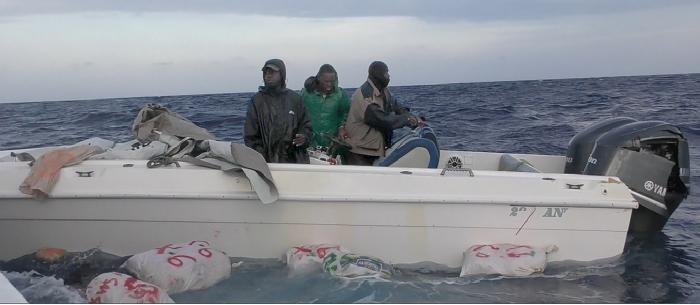
While the world is plunged into the devastating pandemic of COVID-19, hundreds of new and increasingly dangerous synthetic drugs are invading every corner of the planet, adding to the abuse of marijuana, cocaine and heroin, which affect almost 300 million people.
The main market on the planet, the United States, has the highest number of deaths from drug overdoses in its history, with more than 100,000 deaths between April 2020 and the same month in 2021, most of them due to the so-called opioid epidemic, which increased lethality by 28.5%.
Illicit drug trafficking and consumption continue to be a serious global phenomenon that threatens international security and from which no country can escape, due to the complex and sophisticated networks of the lucrative drug trafficking business (more than $600 billion in annual profits), the omnipresence of the mafias, the use of maritime and air corridors, ways of operating and inserting themselves into the dynamics of world trade, and allying with other forms of international organized crime.
The effects of international trafficking continued to impact Cuba in 2021, from the complex regional framework, its incidence in the Caribbean, the existence of routes close to our territory and the arrival of packages dragged by sea currents (recalos), which represented the largest volume of seized drugs and a potential danger for the articulation of internal trafficking. Attempts to smuggle or introduce drugs across maritime and air borders were also confronted; marijuana crops were dismantled and internal trafficking activities were neutralized.
The persistence and intentionality of Cuban and foreign emigrants to organize drug operations with the support of Cuban citizens was noted, for which they rearranged and diversified their actions, using unaccompanied loads, postal shipments and the use of speedboats.
One of the most dangerous trends of the year was the combination of human trafficking operations with attempts to smuggle drugs into the country using speedboats and other vessels, in line with the changes generated by international crime.
Likewise, 18 sightings of suspicious means that violated the airspace and eight vessels in alleged illicit operations were detected, all of which evidences an increase in the threats in the maritime and air environment of the Cuban archipelago.
These challenges demanded a redoubling of surveillance, persecution and coordinated confrontation between the bodies of the Ministry of the Interior (Minint), the General Customs of the Republic, other participating agencies and the people.
A YEAR OF INTENSE CONFRONTATION
According to information provided by MININT, as a result of the confrontation in 2021, Cuba seized a total of 4 162.23 kilograms (kg) of drugs, mostly marijuana; captured five naval means involved in drug trafficking operations and confiscated goods and sums of money due to these illicit activities.
The largest amount of drugs – it was revealed – was seized in the 295 drug seizures, higher than the 153 in 2020, and with a total of 2,338.64 kg of drugs seized in those events. Other high volumes were captured during the seizure of the aforementioned vessels.
As for the air border, 21 international drug trafficking operations were neutralized at the José Martí International Airport in the capital, in which 67.59 kg of these substances were seized and 41 people, including foreigners and nationals, were arrested.
In the fight against the cultivation of marijuana, 97 plantations were discovered, in which 32,868 plants and 48,521 seeds were seized. Meanwhile, 121 acts of internal trafficking were neutralized, with 165.63 kg of marijuana.
CHECKMATE AT SEA
The permanent surveillance and timely response of the specialized forces made it possible to dismantle a criminal network organized by Cubans from Mexico, with a support base in Panama, Costa Rica and Cuba, with the intention of smuggling marijuana, cocaine and methamphetamines, using passengers, cargo and speedboats in combined human and drug trafficking operations. As a result of this operation, 26 individuals were arrested, 303.37 kg of drugs were seized, and a speedboat was captured.
In addition, two other vessels linked to combined human and drug trafficking operations directed to Cuba from Mexico, the U.S. and Jamaica were neutralized and seized, in which significant amounts of marijuana and synthetic cannabinoids were seized.
In addition, two other speedboats were captured with six Bahamian crew members on board, who were seized with 1,291.82 kg of marijuana, and who were linked to operations not directed to Cuba.
The results of 2021 confirm the political will of the Cuban government to continuously strengthen the fight against the serious global scourge of drug trafficking and the prevention of drug abuse, and to prevent the use of airspace and territorial sea by international drug traffickers, with their lethal cargo destined for the main consumer markets, or to try to penetrate the country.
Empty shelves in the U.S.?

Empty shelves in the U.S.?
The crisis caused by the pandemic is visible even in the country that sustains its abundance at the expense of the world.
Translated and edited by Walter Lippmann for CubaNews.

Empty shelves at a Trader Joe’s supermarket on Spring Street, New York. Photo: CNN
A news report, which seems unusual, is going around the world: CNN claims that there are shortages in supermarkets in the United States. It added that those who run the establishments do not see a solution in the short term, while “disgruntled” shoppers have given “vent to their frustration on social networks”.
Images of empty shelves at stores such as Trader Joe’s, Giant Foods and Publix astound those who still cannot believe the fact that there could be shortages in the land of consumerism.
According to CNN, the causes of the shortages are multiple. The two-year pandemic and the impact of the disease on the lack of personnel for functions such as transportation and logistics, which in turn affects the delivery of products and the restocking of stores.
The National Association of Grocery Stores indicates that many of its members have less than 50% of their workforce. Add to this a continuing shortage of truck drivers and record congestion at the ports.
$2.4 trillion was the value of U.S. imports in 2020, according to Statista. Demand for imported food products grew because it is cheaper to bring them in than to produce them. Consumption patterns that favor frozen and packaged products, which require a powerful industry for permanent supply, also play a role.
Due to the pandemic, import levels have decreased due to the impossibility of guaranteeing the transfer of goods from one country to another, and this affects the supply chain, to which is added the lack of suitable personnel to work, due to the increase of contagions within the country due to the circulation of the Omicron strain.
CNN reported that sick leave accounts for 60% of the total number of infections in the country, in addition to quarantine isolations and distancing protocols.
In addition to this situation, there are adverse weather conditions, with very low temperatures, as well as drought and fires that damaged crops such as wheat, corn, soybeans and coffee.
Today, in addition, the population is panicking about shortages and hoarding, which contributes to a further and rapid decrease in supply.
The increase in empty shelves and prices also poses a danger to Biden and the Democrats, as the Republican narrative exposes the ineffectiveness of the president, who promised, when he took office, to contain COVID-19 and economic dislocation for millions and millions of Americans. The crisis implied by the pandemic is visible even in the country that sustains its abundance at the expense of the world.
Creative resistance born in the neighborhoods

Cuba’s creative resistance is born in the neighborhoods (+Video)
“With the experience, with the motivations we have, with the encouragement for what we have achieved this year, what we are looking for is an innovation in community work, and an innovation in social work.” The reflection, made by the First Secretary of the Central Committee of the Communist Party and President of the Republic, Miguel Díaz-Canel Bermúdez, on Tuesday, marks the course of what the country has proposed to achieve from the actions in the most vulnerable neighborhoods.
Translated and edited by Walter Lippmann for CubaNews.
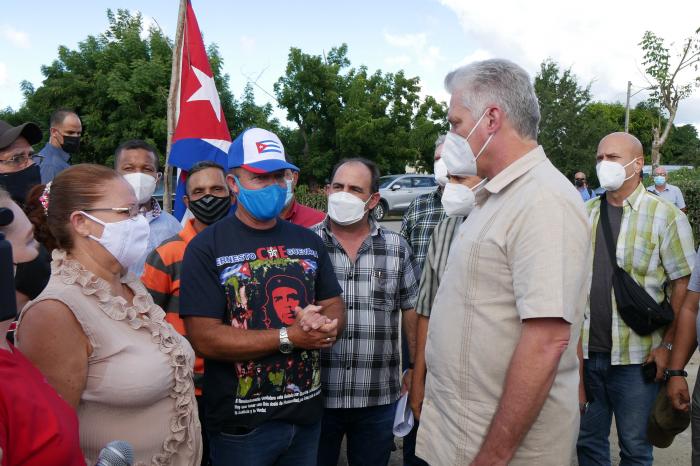
Díaz-Canel
The purpose has been to work together for the community. Photo: Estudios Revolución
“With the experience, with the motivations we have, with the encouragement for what we have achieved this year, what we are looking for is an innovation in community work, and an innovation in social work.” The reflection, made by the First Secretary of the Central Committee of the Communist Party and President of the Republic, Miguel Díaz-Canel Bermúdez, on Tuesday, marks the course of what the country has proposed to achieve through actions in the most vulnerable neighborhoods.
It is precisely the work in the neighborhoods where we find an expression of that concept of creative resistance that we have defended; because it is there in the neighborhoods where all the problems we have are manifested, emphasized the President at the meeting, which was also attended by members of the Political Bureau Salvador Valdés Mesa, Vice President of the Republic; and Roberto Morales Ojeda, Secretary of Organization and Politics of Cadres.
The pandemic manifested itself in the neighborhoods -commented the Head of State-, it is where the effects of the blockade and the measures of the US administration are suffered…. And there, our people have not only been able to resist, but when we summoned them and worked together, they have creatively solved a whole group of problems that in other times had remained unanswered, said the Head of State to representatives of several organizations and the highest leadership of the Party and the Government in the capital, together with whom he evaluated the most recent actions that have been carried out in the 67 Havana communities where they are currently working.
Since that participation, more than 9,500 constructive actions and almost 31,000 social actions have been carried out in the communities.
According to the information provided at the meeting by Havana Governor Reinaldo García Zapata, in these five months, the project has contributed to the improvement of the visual and architectural environment; to the rehabilitation of basic services, together with the installation of new services to the population; 101,128 tons of asphalt have been laid in the paving of 119 kilometers of roads and the construction of 72.1 kilometers of sidewalks; in addition, houses, citadels, buildings and stops have been rehabilitated and built. The more than 2,000 basic sanitation and Aguas de La Habana actions are among the actions that have had the greatest impact, he specified.
Progress has been made in the completion of community structures and factors; in the delivery of supply books; the legalization of housing; offers of job placement and continuity of studies; as well as attention to mothers with three or more children under 17 years of age.
Taking into account the way in which the work has been carried out in the different neighborhoods, García Zapata explained that out of the 67 in which they are working, 22 can conclude the year with the actions carried out in the municipalities of Arroyo Naranjo, Boyeros, Cerro, Cotorro, Guanabacoa, Habana Vieja, La Lisa, Playa, Regla and San Miguel.
At the same time, he proposed to the work team to include 40 new neighborhoods, and to maintain the ones started this year that have pending actions.
The national coordinator of the Committees for the Defense of the Revolution, Gerardo Hernández Nordelo, insisted on the priority that should be given to constant communication with the population, because many times the dissatisfactions are simply related to the lack of information that the inhabitants have about the actions being executed in their community.
And in that sense, he acknowledged, it is also vital the role that mass organizations can develop to explain about plans, work perspectives or lack of resources.
It is about working together for the community. This is the maxim that has prevailed in the neighborhoods and without which, considered the first secretary of the Provincial Committee of the Party, Luis Antonio Torres Iríbar, it would not have been possible to sustain all the actions that have been carried out in these months.
TAKING FULL ADVANTAGE OF THE POTENTIALITIES OF THE NEIGHBORHOODS
Creativity, participation, transformation have been key elements of all the efforts that have been made in the neighborhoods. And as part of the actions carried out there, the President of the Republic highlighted the way in which concepts such as popular power, developed by the Commander in Chief, have been defended; the improvement of democracy in our socialism with popular participation; the quality of everything that is done, because not in all places, he said, things have worked well or resources have been used as they should, as well as the sustainability of everything done, so that we always advance in the work in the neighborhoods and never go backwards.
Although we have been focused on making transformations, healing wounds that existed in the neighborhoods, recovering facilities and improving physical spaces, for 2022 we have the challenge of incorporating more subjectivity and more spirituality, the President reflected.
Knowing what the neighborhood has, what needs to be improved and what it lacks, is essential to be able to develop actions with greater precision in what is needed there, he added.
And if we treat all this from an emotional point of view, if we include a pedagogy and popular education that teaches those who lead how to work with the population and teach the population how to participate properly, we will undoubtedly be contributing to hope and to that transformation through participation, said Díaz-Canel.
Then, he reflected, the people will be seeing how from Socialism and how from the Revolution, with participation, they find meaning in their lives, because from Socialism, from the Revolution, with participation, they are transforming their lives, their individual lives, their family life, their social life, and therefore their community, which is where they carry out most of their activities.
In the search for this path, the Head of State considered it essential to carry out anthropological analysis and research of the neighborhoods, to know what their roots, motivations and aspirations are. He also emphasized that priority should be given to work with senior citizens and young people, two generations eager to contribute and do something.
He also drew attention to the contribution of making better use of the community projects that already exist and the experience of the leaders of these community projects, “who had already come a long way before we went to these actions”.
On the other hand, he commented on the orientation that should be given to the budgets of the municipalities so that they are more oriented towards social programs and attention to situations of vulnerability, and so that the municipality can better manage the financial resources, the budgetary resources to work on these issues.
The will we have and the purpose of strengthening local productive systems will be another strength that each municipality, each community will have to work on these issues, he pointed out.
If we treat all these things as a whole and take advantage of them -he stressed- we really have a very propitious scenario to achieve more transformations and create a better state of satisfaction in the inhabitants of all the communities of the country and that is what we have to work on.
The three battles of 2021

The three battles of 2021
 By Agustín Lage Dávila
By Agustín Lage Dávila
December 28, 2021
Translated and edited by Walter Lippmann for CubaNews.
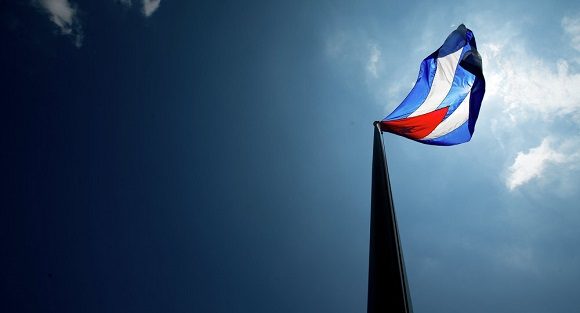
Photo: AP
This (No. 25) is the last note of 2021 and it is unavoidable to use it to summarize the message of what we appreciate has been essential in this difficult but also glorious year.
Cubans, each one from his or her position, with his or her ideas and values, but essentially all of us, have been involved in three great battles that will decide our future:
The control of the COVID epidemic.
The confrontation of the media and cultural aggression against our project of society.
Economic development, even in the context of the blockade.
These posed enormous threats to us: the first one threatened our health, the second one, our thinking, the third one, our material sustenance. The three together threatened our Nation.
In the first two we won, unquestionably. We must consolidate them and project them into the future, because they can continue, but they are essentially victories. In the third one, we managed to resist, which is no small thing, and it is the indispensable step to win, but the great victory still requires a lot of effort and intelligence.
The control of the epidemic of COVID-19 was achieved this year with biotechnology, science, the strength, and the experience and universality of our health system, and the educated participation of the people and their institutions. It validated the fertility of the scientific development strategy implemented by the Revolution for decades, and the importance of the connections between science and production that were built since the founding moments of the Scientific Pole, under Fidel’s leadership.
It validated the concept that health cannot be merchandise, and that the budgeted or entrepreneurial institutions on which health services depend have to be the socialist property of all the people. This is not only for moral reasons (which is the main thing) but also for reasons of efficiency. This battle will leave experiences for the improvement and development of both actors, industry and the health system, which we must apply immediately because the global pandemic context will continue in 2022.
The media and cultural aggression, with which, especially this year, an attempt was made to divide the people and erode their collective capacity to respond to the challenges of the moment, was defeated. Its implementation and financing (we know well by whom), in combination with the reinforcement of the blockade, precisely at a time when we were facing a dangerous epidemic, will go down in history as one of the greatest political immoralities of this century. It will be remembered in the gallery of shame, together with the Weyler reconcentration, the Nazi holocaust, the nuclear bombing, the Vietnam war, the support to the dictatorships of the South American cone, the South African apartheid and the murders of teachers by counterrevolutionary gangs in Cuba. History will not absolve its articulators.
The media and cultural aggression against Cuba is a war of thought. We defeated it, as Martí wanted “with thought”. The encouragement of violence, the promotion of selfish appetites, the distrust in the future of the country, and the dissemination of intellectual superficialities, crashed against the wall of Cuban culture, now solidified by six decades of massive and free access to education. They gambled on finding many influential fools in Cuba, and it turned out that there were very few.
This battle also leaves us experiences for the improvement and development of political and cultural work, which must be well analyzed because this episode of 2021 is part of an historical dispute of more than two centuries.
The third battle, that of economic development, has not yet been won. And it would be superficial to attempt a simplifying analysis in the space of 4 pages of a blog. But there are some things to say:
The first is that we have resisted the longest economic onslaught in world history (60 years), articulated by the largest economic and military power in world history; and we continue to resist 30 years after the collapse of the allies we had in Eastern Europe. And here we are, our people without hunger, without mafias, without housing evictions, with all their children in school, with our people’s government functioning under the socialist Constitution that we made and approved ourselves. This capacity dor resistance makes us proud, not only because of the resistance itself, but also because it indicates our capacity for development. Without sovereignty and national unity, no economic strategy, no matter how “technically brilliant” it might be, could work.
The second is that we are not frozen in old economic strategies, which worked at the time but have already fulfilled their historical role and exhausted their capacity to adapt to the changes in the world economy. We are in a moment of legislative and organizational creativity to adapt our development model to the new realities, without ceasing to be sovereign, equitable, educated and socialist.
The third is that the road to economic and social development must be traveled in a world context that is not the one that existed in the 1960s, when the Revolution made its first plans for economic take-off. We must now work in a globalized economy, which depends much more on the external economic balance, and on the capacity for international insertion, especially for small countries. It is also in an economy of rapidly changing technologies, which demands a higher dynamic of creation of diverse enterprises and connections between enterprises and scientific and educational institutions, as well as a higher dynamic of diversification of products and services of high added value.
All this requires managerial as well as technological creativity, and it is necessary to create the regulatory context that allows and stimulates it; and to train the young cadres who will play a leading role in it.
The fourth is that, with few natural resources and scarce domestic demand, and with a blockade that will continue (because our historical adversaries do not know how, nor can they do otherwise), our audacity to build material prosperity based on social justice and access to knowledge is essentially a cultural challenge. It will be culture, ethical, legal, scientific and technical, that determines our capacity to decouple economic growth from the expansion of inequalities, that expands the space of the possible, and establishes the speed of our progress.
The battles of this year 2021 prepare us to continue building the possible country that we Cubans want. Not the one that others want to impose on us, but the one we Cubans want.
 Agustín Lage Dávila is a prominent Cuban scientist. He was the Director of the Center of Molecular Immunology in Havana for 25 years. Advisor to the President of BioCubaFarma. He has received numerous national and international distinctions. He was Deputy to the National Assembly for several legislatures.
Agustín Lage Dávila is a prominent Cuban scientist. He was the Director of the Center of Molecular Immunology in Havana for 25 years. Advisor to the President of BioCubaFarma. He has received numerous national and international distinctions. He was Deputy to the National Assembly for several legislatures.
German experts on Cuban vaccines

German experts confirm that Cuban COVID-19 vaccines could be part of the continent’s immunogen portfolio
Cuban-made vaccines could form a vital part of the immunogen portfolio that the continent will need for many years to come, say eminent German professors Bert Hoffmann and Jan Felix Drexler, in the article “COVID-19 in Latin America: where we are and what is to come”
Translated and edited by Walter Lippmann for CubaNews.
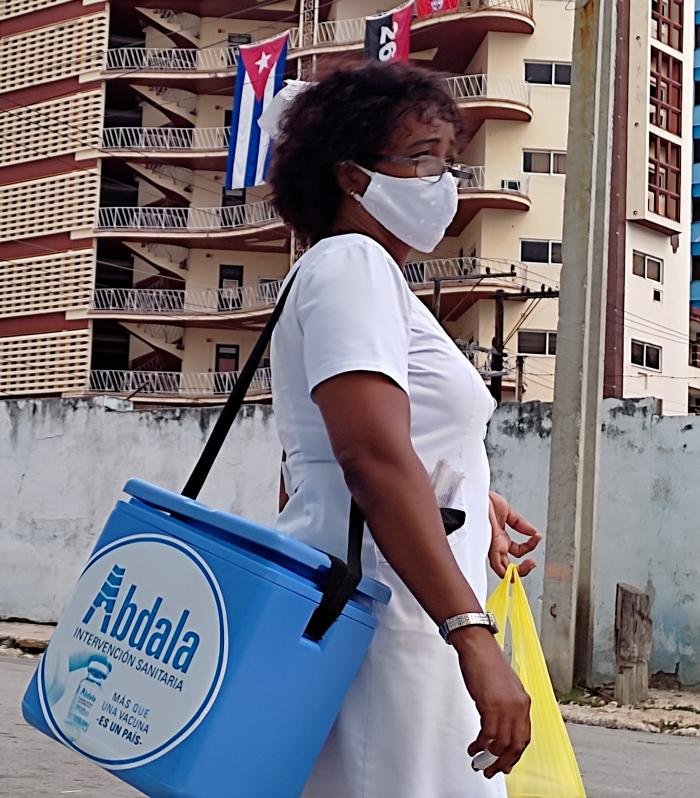
Photo: Ricardo López Hevia
Cuban-made vaccines can form a vital part of the immunogen portfolio that the continent will need for many years to come, say eminent German professors Bert Hoffmann and Jan Felix Drexler, in the article “COVID-19 in Latin America: where we are and what is to come”.
In the text published in the giga magazine of the German Institute for Global and Area Studies, both specialists agree that “given that vaccines are being produced in the region, their trade should be facilitated.
They also reflect on the vaccines that have been inoculated in the Latin American region. These include vectored vaccines such as those of AstraZeneca, Johnson & Johnson or Russia’s Sputnik-V; mRNA vaccines such as those of Pfizer/BioNTech and Moderna (a modified messenger RNA encoding the spike protein); inactivated vaccines such as SinoVac and Sinopharm (which rely on cultured SARS-COV-2 that is chemically inactivated, for example, with formaldehyde); and protein subunit-based vaccines such as Cuba, Abdala and Soberana (which rely on the spike protein receptor-binding domain, in the case of Soberana, coupled to tetanus toxoid to enhance immunogenicity).
“Moreover, Cuba’s vaccines are a different case, as they are not produced under license from international companies, but are original developments of the Island’s biotechnology sector, a remarkable achievement given the country’s economic limitations and the fact that much richer states and pharmaceutical companies did not achieve this,” they point out, elsewhere in the text.
“Cuba also became the first country in the world to vaccinate children over the age of two. By the end of 2021, it is likely that the island will have fully vaccinated 90% of its population,” they point out.
CUBA INTENSIFIES VACCINE PRODUCTION
Cuba reached 40 million doses of the anti-COVID-19 Abdala vaccine, an achievement reached by the shared effort and work of the Center for Genetic Engineering and Biotechnology (CIGB) and the AICA pharmaceutical laboratories, institutions that give prestige to Cuban science.
According to the Twitter account of AICA Laboratories, this result is the result of a common vision, and highlights the importance of teamwork between two entities of the business group of the Biotechnological and Pharmaceutical Industries of Cuba (BioCubaFarma).
Cuba reports 2197 new cases of Covid 19


Ministry of Public Health: Cuba reports 2 197 new COVID-19 cases
Translated and edited by Walter Lippmann for CubaNews.
At the end of yesterday, October 16, 25,457 patients were admitted, 15,123 were suspected, 1,651 were under surveillance and 8,683 were confirmed active.
For COVID-19, a total of 30,359 samples were taken for surveillance during the day, resulting in 2,197 positive results. The country accumulates 10 million 172 thousand 672 samples taken and 934 thousand 965 positive.
Of the total number of cases (2,197): 2,189 were contacts of confirmed cases; 5 with source of infection abroad; 3 with no source of infection specified. Of the 2,197 diagnosed cases, 1,159 were female and 1,038 were male.
Of the 2,197 positive cases, 5.4% (118) were asymptomatic, making a total of 129,294, representing 13.9% of those confirmed to date.
The 2 197 diagnosed cases belong to the following age groups: under 20 years of age (495), 20 to 39 years of age (488), 40 to 59 years of age (681) and over 60 (533).
=====
Of the 934,965 patients diagnosed with the disease, 8,683 remain hospitalized, of whom 8,428 have a stable clinical course. There were 8058 deaths (21 during the day), with a case fatality rate of 0.86% vs. 2.04% in the world and 2.45% in the Americas; two evacuated, 55 returned to their countries. During the day there were 2,274 discharges, 918,167 patients recovered (98.2%). There are 255 confirmed patients in intensive care, of which 88 are critical and 167 are serious.
During the day, 21 patients died. We deeply regret what happened and convey our condolences to their families and friends.
=====
As of October 16, 190 countries and 32 territories have reported cases of COVID-19, with 241 million 65 thousand 235 confirmed cases (+ 436 thousand 600), 17 million 870 thousand 542 active cases and 4 million 908 thousand 8 deaths (+ 7 thousand 117) for a case fatality rate of 2.04% (=).
In the Americas region, 93 million 106 thousand 348 confirmed cases (+ 135 thousand 747) were reported, 38.62% of the total number of cases reported in the world, with 11 million 50 thousand 910 active cases and 2 million 282 thousand 106 deaths (+ 4 thousand 185) for a case fatality rate of 2.45% (=).
Border Opening Begins as of November 15

Cuba’s borders will be gradually opened as of November 15
Considering the progress in the vaccination process in Cuba, its proven effectiveness and the prospect that more than 90% of the entire population will complete their vaccination schedules in November, conditions are being prepared to gradually open the country’s borders as of November 15, 2021.
Translated and edited by Walter Lippmann for CubaNews.
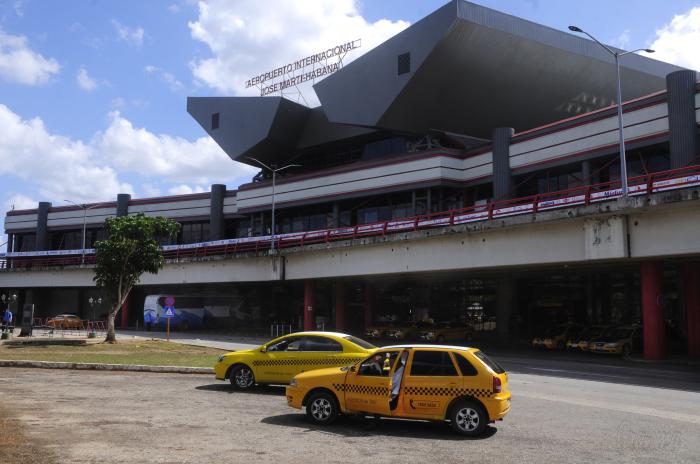
New sanitary protocol measures at José Martí airport adopted to José Martí, Boyeros. Photo: Endrys Correa Vaillant
Taking into account the progress in the vaccination process in Cuba, its proven effectiveness and the perspective that more than 90% of the entire population will conclude the vaccination schedules in November; conditions are being prepared to open, gradually, the country’s borders as of November 15, 2021.
According to a note from the Ministry of Tourism sent to our editorial office, health and hygiene protocols will be made more flexible upon the arrival of travelers, which will be focused on the surveillance of symptomatic patients and the taking of temperature. In addition, diagnostic tests will be performed randomly, PCR will not be required upon arrival and travelers’ vaccination certificates will be recognized.
The domestic tourist market will also be opened gradually, in accordance with the epidemiological indicators of each territory.
Florida: Pandemic’s Epicenter in the U.S.

Florida: Epicenter of the Pandemic in the U.S.
Unfortunately, at the beginning of this week, this territory has registered almost 25% of the hospitalizations due to COVID in the whole country, despite the fact that Florida represents only 6% of the total population of that nation.y
Translated and edited by Walter Lippmann for CubaNews.
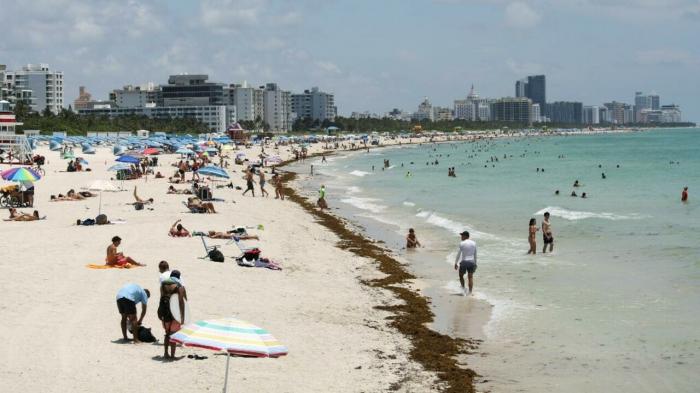
General view of a crowded beach in South Beach, Florida. The state accounts for nearly 25% of COVID-19 hospitalizations in the U.S. Photo: Reuters Photo: Reuters
If truth, not interference and hatred, prevailed in our world, a “humanitarian intervention” would be called for right now in the state of Florida, the current epicenter of the peak of the COVID-19 pandemic in the United States.
That territory, unfortunately, is the site of nearly 25% of the nation’s COVID hospitalizations this week, despite the fact that Florida represents only 6% of the nation’s total population.
Also of concern is that Miami-Dade, the state’s most populous county with some 2.7 million people, has been the number one county for infections and deaths throughout the pandemic and remains so today.
However, after Florida reached 21,683 new cases this Saturday, the state governor, Republican Ron DeSantis, continues to resist issuing an order for the mandatory use of masks and the requirement of vaccinations by employers.
But there’s more: Florida Republican Senator Marco Rubio noted on Twitter Monday that there is a “hysteria” by the media regarding COVID, “because bad news sells.” And he stated, “The real story here is how, for fully vaccinated people, the risk of serious disease appears to be close to zero.”
However, data from the Johns Hopkins University show that Florida is the third state in number of cases and the fourth in number of deaths in the entire United States, the country most affected by the pandemic in the world, with more than 35 million infected and 613,000 deaths, as of March 1, 2020.
To give a more complete picture of the situation in the nation, some 72,000 children and adolescents contracted the disease in the week of July 22-29, a figure five times higher than in the previous month, according to the American Academy of Pediatrics. And 20,000 of these cases are in Florida.
Now, what is the other reality that can be observed today in the territory: On the one hand, what has been described above and which reflects how the COVID-19 with its new Delta variant is hitting the Floridian population, and on the other hand, the Republican government there, as is also the case in Texas, is adopting resolutions so that the inhabitants, including children, do not use masks or have to apply social distancing measures, as warned by health authorities.
Next week, students in that state will resume classes in person, and the use or not of masks by students is also part of the political debate, an aspect that has become a business, since parents who do not accept such measures are encouraged to transfer their children to private schools, where regulations could be more flexible.
Therefore, it should not be surprising that in Florida and, specifically, in Miami, the beaches are crowded with people, mostly children and young people; that bars and other entertainment centers are open and that this is the other side of a reality that, unfortunately, is already lethal.
In this situation, White House spokeswoman, Jen Psaki, declared that while 25% of the hospitalizations in the country are in Florida, the governor (DeSantis) has taken steps that go against the recommendations of Public Health. She added: “The situation is too serious, deadly serious, to act in a partisan manner.”
What proposals for a solution would be given by those who, right there in Florida, have asked President Joe Biden for a humanitarian (read military) intervention against Cuba. Or is it that the dead and the infected in Florida do not count when it comes to politicking, as Marco Rubio and other feverish promoters of hatred, the blockade and the attacks against our Island do.
New Worlds

New Worlds
 Author: Victor Fowler | internet@granma.cu
Author: Victor Fowler | internet@granma.cuTranslated and edited by Walter Lippmann for CubaNews.
A few days ago, on Tuesday 27th and for a couple of hours, more than a hundred people (most of them young) exchanged ideas about the events of July 11th in the country. In a panel -organized by the La Manigua collective and transmitted in its voice chat under the leadership of psychologist and activist Karima Oliva Bello- we listened to the remarks of Verónica Medina (actress and vice-coordinator of La Madriguera), Iramís Rosique (member of the Editorial Board of La Tizza and specialist of the Network in Defense of Humanity) and José Ernesto Nováez (journalist and writer, coordinator of the Cuban Chapter of the Network in Defense of Humanity). I don’t know if they have participated in a voice chat on Telegram, a messaging application that (like the popular WhatsApp or the Cuban Todus) which allows the gathering of communities in a virtual “living room” in which they “converse” in real-time, thanks to the exchange of audio messages.
After the initial comments by the panelists, the exchange was open to the participation of more than a hundred listeners who gathered for the occasion. Then a range of ideas flowed that covered, among many other issues, aspects as diverse as the pointing out of errors in the political and/or cultural work within disadvantaged populations; assessments of the relevance or error of having eliminated spaces for collective development such as the scholarship system or the pioneer camps; the substitution of political work (discursive, explanatory, dialogic, pedagogical) for superficial administrative vision (which stops at the management of figures, flows and operations); the need to undertake a profound renovation of structures of popular power such as the CDRs, the FMC and the Poder Popular itself; the obligation for the state and political apparatuses to continuously revive their interactions with the citizens. This is needed so that, in the midst of a relentless economic, political, ideological and cultural war against Cuban socialism, any sign of estrangement, distance or alienation between the population and these directive bodies is prevented.
In addition, there is the need to reinvent the discourses and ways of communicating; the request to eliminate any demand for an active revolutionary policy that continuously rectifies problems of vulnerability, poverty, marginality and their cultural, behavioral, social and educational consequences, social integration and personal fulfillment; the need to increase the participation and, in general, the leading role of young people in society, whether in concrete actions or in the reflection and dissemination of new ideas; the demands on the mass media regarding the importance of showing a more active role, as well as greater immediacy and depth in the analysis and dissemination of the country’s problems, the continuous presence of such problems/demands in the various party instances, the efforts bu State agencies to solve or mitigate them and, most importantly, the placement in the foreground of the communities’ responses; the need to change models of action and/or communication to make the fight against corruption, state bureaucracy, “campaigning” and the weaknesses of the media itself more transparent.
A day earlier, on July 25, this same voice chat had connected us live with the arrival at the Capitol in Washington of the members of Puentes de Amor, a project of solidarity with Cuba and the fight against the blockade, coordinated by Carlos Lazo in the United States. Weeks before, in another transmission, also made from the space of social networks, the collectives of Bufa Subversiva, Brújula Sur, Cimarronas, Horizontes Blog and La Tizza met to create the “collaborative broadcasting channel” Malas compañías. There they developed another very interesting discussion, which they titled Comunidad lgtbiq+ en Cuba. Where are we and where are we going?
These are names of new spaces for the presentation and discussion of ideas, as well as actors to postulate them. In communicational terms, the transformation leads to the obligation to assimilate and produce for a world in which greater speed, diversity and integration between text, audio, still images and video messages are imposed. In addition to the above, a world where exchanges become more challenging, captivating and interactive the greater the dialogicity.
On the one hand, I am interested in listening, and I confess to having enjoyed these exchanges of opinion in territories that require me to abandon my clumsiness in the handling of digital communication technologies, and to quickly incorporate myself into the many options offered by the universe of social networks, blogs, websites, podcasts, voice chats and other alternatives for establishing contact. I believe that there is an enormous potential that political and mass organizations, state entities, neighborhood structures and the most diverse projects of social transformation need to assume, integrate into their work and daily practices, and make the critical analysis of problems, communicative transparency, participation and social dialogue in the country increasingly diverse, extensive, deep and significant in its transformative character.
Subscribe to Blog via Email
| M | T | W | T | F | S | S |
|---|---|---|---|---|---|---|
| 1 | 2 | 3 | 4 | 5 | 6 | 7 |
| 8 | 9 | 10 | 11 | 12 | 13 | 14 |
| 15 | 16 | 17 | 18 | 19 | 20 | 21 |
| 22 | 23 | 24 | 25 | 26 | 27 | 28 |
| 29 | 30 | |||||


You must be logged in to post a comment.